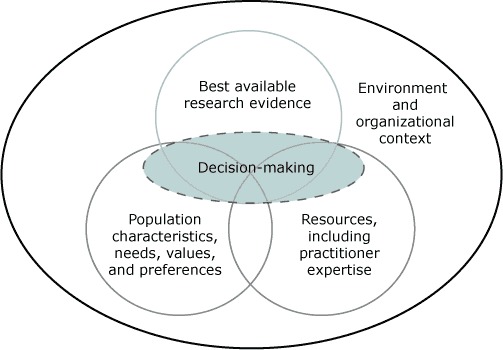Resources Lesson 1: Evidence Based Public Health
We are probably all familiar with the notion of 'Evidence-Based Medicine', EBM, the term having been expanded to Evidence-Based Practice to go beyond clinical practice. An evidence base for Public Health is as important as it is for individual patient care in clinical practice - in fact probably more so since a Public Health policy may affect many thousands of individuals. One of the main differences is that it is much easier to design and undertake a randomised controlled drug trial amongst patients (in fact EBM has been termed Pharmaceutical Based Medicine as so much of EBM deals with pharmaceutical agents), than it is to design high quality research into population-based interventions and collect evidence.
The Population Health Evidence Cycle is an easy way to conceptualise the way we collect and use evidence in Public Health (from Heller, Evidence for Population Health, OUP, 2005)
Need for Evidence Based Practice
The paper Building capacity for evidence-based public health: Reconciling the pulls of practice and the push of research provides an excellent overview of why Evidence Based Pubic Health matters.
It is complicated!
The abstract of the paper: Tools for implementing an evidence-based approach in public health practice by Jacobs et al states: "Increasing disease rates, limited funding, and the ever-growing scientific basis for intervention demand the use of proven strategies to improve population health. Public health practitioners must be ready to implement an evidence-based approach in their work to meet health goals and sustain necessary resources. We researched easily accessible and time-efficient tools for implementing an evidence-based public health (EBPH) approach to improve population health. Several tools have been developed to meet EBPH needs, including free online resources in the following topic areas: training and planning tools, US health surveillance, policy tracking and surveillance, systematic reviews and evidence-based guidelines, economic evaluation, and gray literature. Key elements of EBPH are engaging the community in assessment and decision making; using data and information systems systematically; making decisions on the basis of the best available peer-reviewed evidence (both quantitative and qualitative); applying program-planning frameworks (often based in health-behavior theory); conducting sound evaluation; and disseminating what is learned." You can link to a full text of the paper.
Here is a diagram from Toward a Transdisciplinary Model of Evidence-Based Practice by Statterfield et al with their model for Evidence Based Practice - of relevance to clinical and public health.

A practical demonstration of how to approach Evidence Based Practice
This tutorial, from the University of Minnesota Health Science Libraries gives an excellent introduction to Evidence Based Practice and how to get started. Click on it here.
Some other resources
Explore some of the resources from The Centre for Evidence Based Medicine at Oxford University.
Trip database - Trip is a clinical search engine designed to allow users to quickly and easily find and use high-quality research evidence to support their practice and/or care. You can filter to find evidence related to developing countries.
Can we apply an evidence basee to global health policies?
It is even more difficult to apply an evidence base to health policy - as this quote from A Comparison of Frameworks Evaluating Evidence for Global Health Interventions demonstrates:
"As global health policymakers move towards evidence-based approaches, we find a gap between what is currently available and the needs for an evidence framework appropriate for application to a global health setting in a low- and middle-income country context. More work is needed to either adapt one or more existing frameworks, or to develop an entirely new framework to meet the needs of policymakers and others responsible for implementing global health interventions."
Finally, this section can only offer an introduction to this important topic, but we include it to demonstrate the critical importance of an evidence base for Public Health.
